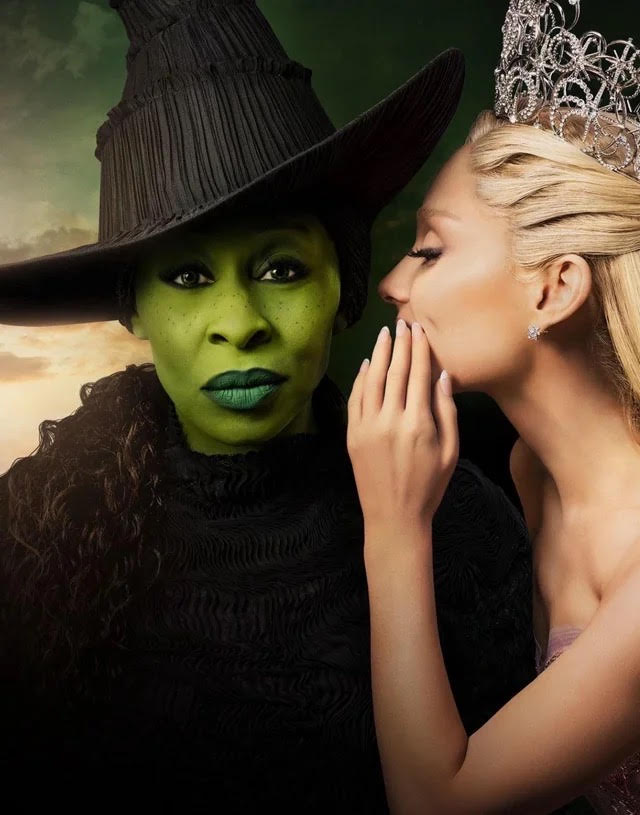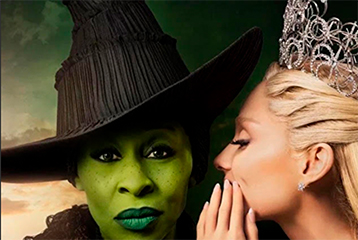 My wife and I took Annie, one of our grandkids, to the movies the other day to see “Wicked,” the film adaptation of the Broadway musical. At two hours and forty minutes, it’s a long movie. It’s also dense—a complex psychological fable for our age. In case you haven’t seen it yet, I’m not going to spoil it by unraveling the plot for you. Let’s just say there’s a lot to unpack. Oh—and this rendition is only Part One; Part Two drops next year. Talk about delayed gratification!
My wife and I took Annie, one of our grandkids, to the movies the other day to see “Wicked,” the film adaptation of the Broadway musical. At two hours and forty minutes, it’s a long movie. It’s also dense—a complex psychological fable for our age. In case you haven’t seen it yet, I’m not going to spoil it by unraveling the plot for you. Let’s just say there’s a lot to unpack. Oh—and this rendition is only Part One; Part Two drops next year. Talk about delayed gratification!
After the movie, we returned home and ate supper in front of the TV. At this time of year, there are a lot of Christmas movies on channels all over the map. Every year, we indulge ourselves and watch many—OK, most—of them: “White Christmas,” “It’s a Wonderful Life,” “ A Christmas Story” (my favorite), “Love Actually,” “The Grinch,” “Elf,” and, of course, “Miracle on 34th Street.” (There are some B listers, too, but we avoid those.) Anyway, the night Annie came to visit, we were scrolling through the channel list and came upon “The Sound of Music.” Maybe it’s not really a Christmas movie, but who doesn’t relish the love story of Postulate Maria (Julie Andrews) and retired Captain Gregor Von Trapp (Christopher Plummer) and the widowed Captain’s seven singing moppets. And if the love story isn’t enough, there’s also the added intrigue of the Nazi Anschluss into Austria in 1938 and the last-minute escape of the Von Trapp singers over the mountains into neutral Switzerland.
If movies are a reflection of our time and culture, we ran the gamut that day with Annie. “The Sound of Music” was released in the spring of 1965, not exactly a benign time, but decidedly prior to many of the cultural wars of the late 1960s and beyond. It’s a charming and innocent film, full of sing-along tunes, and it has a happy ending.
“Wicked,” on the other hand, is dark, and the ending—at least of Part One—is neither happy nor resolved. The principle characters—Glinda and Elphaba—each have a significant childhood backstory that informs their adult characters. Moreover, woven into the subtext of the film like the false strands of an heirloom Persian rug, there are veiled references to human (and animal) rights, political repression, thought control, and an all-powerful ruler who seems benign enough on the surface, but who, along with his power-wielding minions, reveals a much more dangerous and nefarious side. On top of all that, the music and lyrics of the songs in “Wicked” are hardly light as Austria’s Alpine air. And as for the flying monkeys who seemed comical enough in “The Wizard of Oz,” in “Wicked,” they are the stuff of vivid nightmares for children and adults alike. I’m still shaking,
At the conclusion of “The Sound of Music,” goodness triumphs over evil, at least for the Von Trapp family. But now that we’re halfway through the “Wicked” narrative, I’m not sure that good will triumph over evil, or over anything else ever again. Maybe Part Two will prove me wrong—we will all just have to wait and see.
I’ll be right back.
Jamie Kirkpatrick is a writer and photographer who lives in Chestertown. His work has appeared in the Washington Post, the Baltimore Sun, the Philadelphia Inquirer, the Pittsburgh Post-Gazette, the Washington College Alumni Magazine, and American Cowboy Magazine. His new novel, “The Tales of Bismuth; Dispatches from Palestine, 1945-1948” explores the origins of the Arab-Israeli conflict. It is available on Amazon.



Barbara Chase says
A few years back I saw WICKED on Broadway and absolutely loved it. But it seems whenever Hollywood gets its rights to something, it always makes me doubtful that they will “treat it well” (like the original). I do not want to see how they’ve “doctored” WICKED and thank you for your Heads Up! (Witness ANNIE for example)